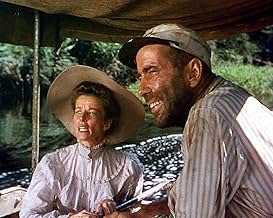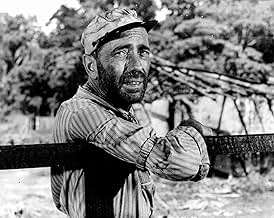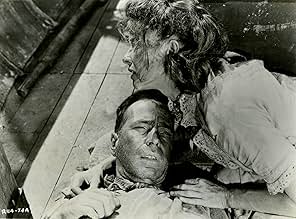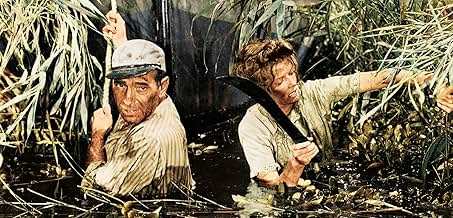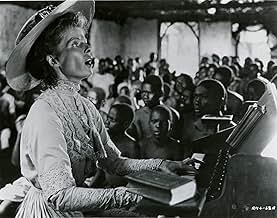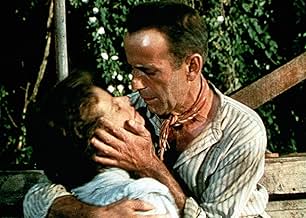ÉVALUATION IMDb
7,7/10
86 k
MA NOTE
En Afrique, pendant la Première Guerre mondiale, un capitaine de bateau, gros buveur de gin, se laisse persuader par une missionnaire guindée d'attaquer un navire de guerre ennemi.En Afrique, pendant la Première Guerre mondiale, un capitaine de bateau, gros buveur de gin, se laisse persuader par une missionnaire guindée d'attaquer un navire de guerre ennemi.En Afrique, pendant la Première Guerre mondiale, un capitaine de bateau, gros buveur de gin, se laisse persuader par une missionnaire guindée d'attaquer un navire de guerre ennemi.
- A remporté 1 oscar
- 5 victoires et 9 nominations au total
Harry Arbour
- German Sergeant Major at Kungdu
- (uncredited)
Errol John
- Undetermined Role
- (uncredited)
Joseph Layode
- African Sergeant
- (uncredited)
Gerald Onn
- Petty Officer
- (uncredited)
John von Kotze
- German Officer
- (uncredited)
Histoire
Le saviez-vous
- AnecdotesSources claimed that everyone in the cast and crew got sick except Humphrey Bogart and John Huston, who said they avoided illness by essentially living on imported Scotch whiskey. Bogart later said, "All I ate was baked beans, canned asparagus and Scotch whiskey. Whenever a fly bit Huston or me, it dropped dead."
- GaffesThe propeller on the boat is made of bronze (stainless steel hadn't been invented yet). Bronze cannot be easily welded, even with the proper equipment, but he welds a new blade to the propeller. (In the book, Allnut makes a replacement blade out of iron, and rivets it to the bronze propeller.)
- Citations
Captain of Louisa: By the authority vested in me by Kaiser William the Second I pronounce you man and wife. Proceed with the execution.
- Générique farfeluOpening credits prologue: GERMAN EAST AFRICA September 1914
- ConnexionsEdited into Spisok korabley (2008)
- Bandes originalesGod of Grace and God of Glory (Cwm Rhondda)
(uncredited)
Words by Harry Fosdick
Music by John Ceiriog Hughes
Commentaire en vedette
To face a script in which most of the plot revolves around the dialogue of only two people in one location must be terrifying. Thank goodness for Katharine Hepburn and Humphrey Bogart. John Huston's adaptation of C.S. Forester's The African Queen was solid. And the decision to film on location in Africa helped develop the concept of nature as a viable character within the plot helps solidify the film. But without Katharine Hepburn, and Humphry Bogart, this film could have been reduced to a nice little travelog on the beauty and terror of African and the pretty animals living there. Within The African Queen each character undergoes metamorphosis. Charlie Alnutt grows from an apathetic man who enjoys the inside of a bottle, to a courageous man. Rosie in turn allows herself to be human, and vulnerable perhaps for the first time in her life. With lesser actors these changes would have appeared rushed, unexplained,and a dull beginning to an inexplicable romance. But it isn't. It's a captivating film. Rosie's brittle smile, Charlie's face as his vices are destroyed, these are moments of brilliance in an incredible film. I highly recommend it.
It's also worth noting that this was not an easy film to make. These performances survived crew and cast illnesses, constant mechanical errors and inclement weather. For more about the conditions it was created under, I suggest you read Katherine Hepburn's The Making of The African Queen or How I went to Africa with Bogart, Bacall and Huston and almost lost my mind. She's not the sanest author in the world, but all the more enjoyable.
It's also worth noting that this was not an easy film to make. These performances survived crew and cast illnesses, constant mechanical errors and inclement weather. For more about the conditions it was created under, I suggest you read Katherine Hepburn's The Making of The African Queen or How I went to Africa with Bogart, Bacall and Huston and almost lost my mind. She's not the sanest author in the world, but all the more enjoyable.
- Kayt R
- 16 août 2000
- Lien permanent
Meilleurs choix
Connectez-vous pour évaluer et surveiller les recommandations personnalisées
Détails
Box-office
- Budget
- 1 000 000 $ US (estimation)
- Brut – à l'échelle mondiale
- 46 305 $ US
- Durée1 heure 45 minutes
- Rapport de forme
- 1.37 : 1
Contribuer à cette page
Suggérer une modification ou ajouter du contenu manquant

Lacune principale
By what name was La reine africaine (1951) officially released in India in English?
Répondre






